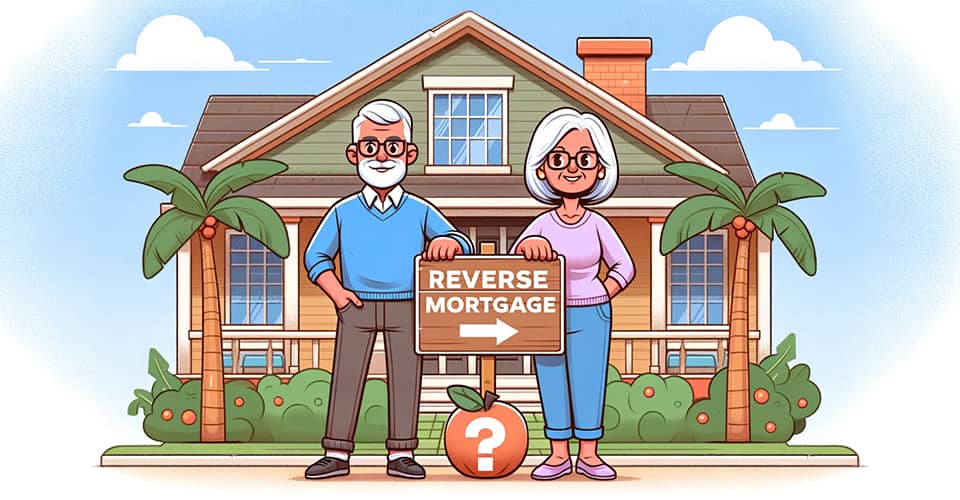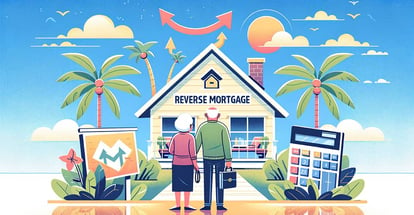Reverse Mortgage FAQ: Everything You Need to Know in 2024
Welcome to our Reverse Mortgage FAQ article, where we have compiled everything you need to know about reverse mortgages in 2024.
As one of the most popular financial products available to seniors, reverse mortgages offer many benefits, such as supplementing retirement income, paying off debts, and even purchasing a new home.
However, they can also be complex and confusing for those who are new to the concept. That's why we have put together this comprehensive FAQ to help you understand the ins and outs of reverse mortgages.
In this article, we will cover some of the most common questions that seniors have about reverse mortgages, including how they work, eligibility requirements, loan options, fees, and more.
Whether you're considering a reverse mortgage for yourself or a loved one, we hope that this article will provide you with the information you need to make an informed decision.
Qualification
A key question for many considering reverse mortgages is whether their home is eligible. Fortunately, a wide range of property types qualify for this type of loan.
Eligible properties include single-family homes, multi-unit properties (up to four units), condominiums, townhouses, and manufactured homes constructed post-June 1976.
However, co-operative units are not eligible for reverse mortgages. If you reside in a co-op, alternative options might be needed to access your home equity.
Beyond the type of property, other factors play a crucial role in your eligibility for a reverse mortgage. These include your age, the equity in your home, and your ability to upkeep the property and keep up with property taxes and insurance payments.

Special Requirements
The key eligibility criterion is age: you must be 62 years or older. Additionally, owning a home with sufficient equity to secure the loan is crucial.
Notably, there are no health-related qualifications, opening up this financial option to individuals with diverse health statuses, allowing them to tap into their home equity.
However, it’s essential to be aware of the financial assessment conducted by lenders. This process evaluates whether potential borrowers can consistently handle essential expenses, such as property taxes and homeowner’s insurance.
The purpose of this assessment is to minimize the risk of loan default by ensuring borrowers can meet these necessary financial commitments.
In cases where there’s a concern about a borrower’s ability to keep up with these payments, lenders might allocate a portion of the loan amount to cover future expenses.
This provision is designed to help borrowers maintain their property and fulfill their financial obligations, safeguarding both the borrower and the lender.
Existing Mortgage
The good news is that it is possible to obtain a reverse mortgage even if you still owe money on your home.
However, it’s crucial to know that the reverse mortgage must hold the primary lien position. This means any existing debts against the home must be settled.
Settling your existing mortgage can be achieved in various ways, such as utilizing personal savings or receiving help from family or friends. Alternatively, you can use the funds from the reverse mortgage itself to clear the existing mortgage.
For instance, if you owe $100,000 on your current mortgage and are eligible for a reverse mortgage of $125,000, you can use the reverse mortgage funds to pay off the old mortgage, leaving $25,000 for other uses.
Remember, even after taking out a reverse mortgage, you’re still responsible for property taxes, homeowner’s insurance, and maintaining the property.
Despite these responsibilities, reverse mortgage funds can be a significant financial resource, aiding in supplementing retirement income or managing unexpected expenses.
Social Security and Medicare
First and foremost, it's worth noting that a reverse mortgage does not affect regular Social Security or Medicare benefits. These benefits are not means-tested, which means they are not based on your income or assets.
However, if you receive Medicaid or Supplemental Security Income (SSI), any reverse mortgage proceeds that you receive must be used immediately. Any funds that you retain will count as an asset and could potentially impact your eligibility for these programs.
For example, if you receive a lump sum of $4,000 for home repairs and spend it all in the same calendar month, there should be no impact on your eligibility for Medicaid or SSI.
However, if there are any residual funds remaining in your bank account the following month, they would count as an asset.
If the total liquid resources (including other bank funds and savings bonds) exceed $2,000 for an individual or $3,000 for a couple, you could become ineligible for Medicaid.
To avoid any potential issues, it's important to consult with a local Area Agency on Aging or a Medicaid expert to ensure that you fully understand the impact of a reverse mortgage on your specific situation.
By doing so, you can make an informed decision about whether a reverse mortgage is the right choice for you.
When a Reverse Mortgage is a Bad Idea
One such circumstance is if you intend to leave your home within the next 2 to 3 years. This is because the upfront costs associated with a reverse mortgage can be significant, and you may not have enough time to recoup these costs before you move out.
In such cases, it may be worth exploring other options that are less expensive, such as home equity loans, no-interest loans or grants that may be offered by your county government or a local non-profit to repair your home, or a tax deferral program if you're having problems paying your property taxes.
Another circumstance where a reverse mortgage may not be the best option for you is if you plan to leave your home to your children.
In many cases, the home is sold to pay back a reverse mortgage, which means that your children may not inherit the property as they had hoped.
Payment Options
A reverse mortgage offers various payment plan options to meet your financial needs. You can choose from four different payment plans - lump sum, tenure, term, and line of credit.
The lump sum payment option provides you with a one-time payment of the entire loan amount at closing. This option may be useful if you need the money to pay off an existing mortgage, cover medical expenses, or fund a large purchase.
With the tenure payment option, you will receive equal monthly payments for as long as you live in your home as your primary residence. This option provides a reliable source of income that you can use to cover regular expenses.
The term payment option provides equal monthly payments for a set period of time. This option may be beneficial if you have a specific financial goal, such as paying off debts or funding home repairs.
The line of credit payment option allows you to draw funds as needed, similar to a home equity line of credit. The unused portion of the credit line grows over time and can be accessed in the future.
You can also choose to combine these payment options to fit your specific financial goals. With a reverse mortgage, you have the flexibility to choose the payment plan that works best for you.
Use of Proceeds
There are no restrictions on how you can use the proceeds, and the money is tax-free.
The proceeds can be used to supplement your retirement income and cover daily living expenses, or to pay for medical bills, home repairs or modifications to make your home more accessible, and to pay off existing debts.
Many seniors use the proceeds from a reverse mortgage to cover property taxes and prevent foreclosure. Some borrowers also use the funds to take a dream vacation or to gift money to their children or grandchildren. The choice is yours.
Interest
The interest on the loan accrues over time and is added to the loan balance. The interest rate can be fixed or variable and is typically based on an index, such as the U.S. Constant Maturity Rate, plus a margin.
It's important to note that interest is only charged on the proceeds you receive from the reverse mortgage, not on the entire value of your home.
Additionally, interest is not paid out of your available loan proceeds. Instead, it accumulates over the life of the loan until repayment occurs.
When the loan is eventually repaid, either through the sale of the home or other means, the amount owed includes the principal amount borrowed plus any accumulated interest and fees.
The borrower or their heirs may choose to repay the loan by selling the home, using other assets, or refinancing with a traditional mortgage.
Growth Feature
If you have a Home Equity Conversion Mortgage (HECM) Line of Credit, the unused balance may have a growth feature. However, it doesn't mean that you're earning interest like in a savings account.
Instead, the principal limit of your HECM loan will increase each month after the first month, at a rate that is equal to one-twelfth of the mortgage interest rate in effect at that time, plus one-twelfth of the monthly mortgage insurance premium rate.
This growth feature should be seen as a further extension of credit, rather than an interest accrual. This growth feature can be advantageous because it allows the unused balance in your line of credit to grow over time, providing you with a potentially larger pool of funds to tap into in the future.
Keep in mind, however, that this growth feature is subject to certain limitations and may not always be available, depending on the specific terms of your loan.
Also, the growth of the unused balance will depend on the interest rate environment at the time, so there is some level of uncertainty associated with it.
Servicing Fee
If you're considering a reverse mortgage, it's important to understand the servicing fee and how it works. The service fee set aside is a specific dollar amount that is deducted from your Original Principal Limit, and it's meant to ensure that your monthly servicing fee will be paid in the future.
It's important to note that the service fee set aside is not part of your outstanding balance and does not accrue interest.
Therefore, any funds remaining in the service fee set aside at the time of loan repayment are not subject to refund.
The monthly servicing fee covers the costs associated with administering your reverse mortgage loan, including maintaining accurate records of your outstanding loan balance, tracking property taxes and insurance, and issuing payments and statements of account.
Prepayments
Partial prepayments can be made to your reverse mortgage account without penalty in most cases.
Prepayments refer to any payments you make towards your reverse mortgage balance in addition to your regular obligations. These are optional payments that can be made without penalty in most cases, intended to reduce your loan balance and interest accrual over time.
Most reverse mortgage accounts allow for such penalty-free partial prepayments, but their application varies by product.
In a Home Equity Conversion Mortgage (HECM), for example, payments are systematically applied: first to mortgage insurance premiums, then to servicing fees, followed by interest charges, and finally to the principal balance.
It’s vital to consult with your loan servicer to understand how your prepayments will be specifically applied to your account. MFYH advises a thorough discussion with your reverse mortgage servicer regarding your loan’s prepayment options.
This will provide a clearer understanding of how these payments are allocated and their effect on reducing your loan balance over time.
Property Taxes
Falling behind on property taxes is considered a default under the terms of your loan agreement and can trigger a loan default.
One option for paying your property taxes is through a "Tax Set Aside." This option allows you to work with your reverse mortgage servicer to determine your annual property tax amount and how many years you want them to pay the taxes on your behalf.
The required amount is then set aside from your loan proceeds, so it is important to budget for this cost accordingly.
It's important to note that you may also participate in property tax deferral or exemption programs, but you should consult with your loan servicer before doing so.
If you participate in a property tax deferral program, the lien created by the program must be subordinate to your reverse mortgage loan.
Some areas may allow for tax exemption programs, and your loan servicer can help you navigate participation in such programs.
Bankruptcy
Reverse mortgage borrowers may wonder what happens to their loan if they file for bankruptcy. In general, filing for bankruptcy does not automatically trigger a default under the Home Equity Conversion Mortgage (HECM) program.
However, borrowers will not be able to access any additional funds from their reverse mortgage unless that request for funds is approved by the court or trustee monitoring the bankruptcy proceedings.
It is important for borrowers to notify their loan servicer once any bankruptcy action is taken. If the reverse mortgage is not a HECM loan, borrowers should check with their loan servicer to determine if bankruptcy is a default under the terms of their loan.
In any case, it is crucial for borrowers to stay current on their property taxes and homeowners insurance payments during bankruptcy proceedings.
Failure to keep these obligations current can result in a default under the loan agreement, which may be grounds for calling the loan due and payable.
With over 50 years of mortgage industry experience, we are here to help you achieve the American dream of owning a home. We strive to provide the best education before, during, and after you buy a home. Our advice is based on experience with Phil Ganz and Team closing over One billion dollars and helping countless families.

About Author - Phil Ganz
Phil Ganz has over 20+ years of experience in the residential financing space. With over a billion dollars of funded loans, Phil helps homebuyers configure the perfect mortgage plan. Whether it's your first home, a complex multiple-property purchase, or anything in between, Phil has the experience to help you achieve your goals.


 By
By  Edited by
Edited by 






